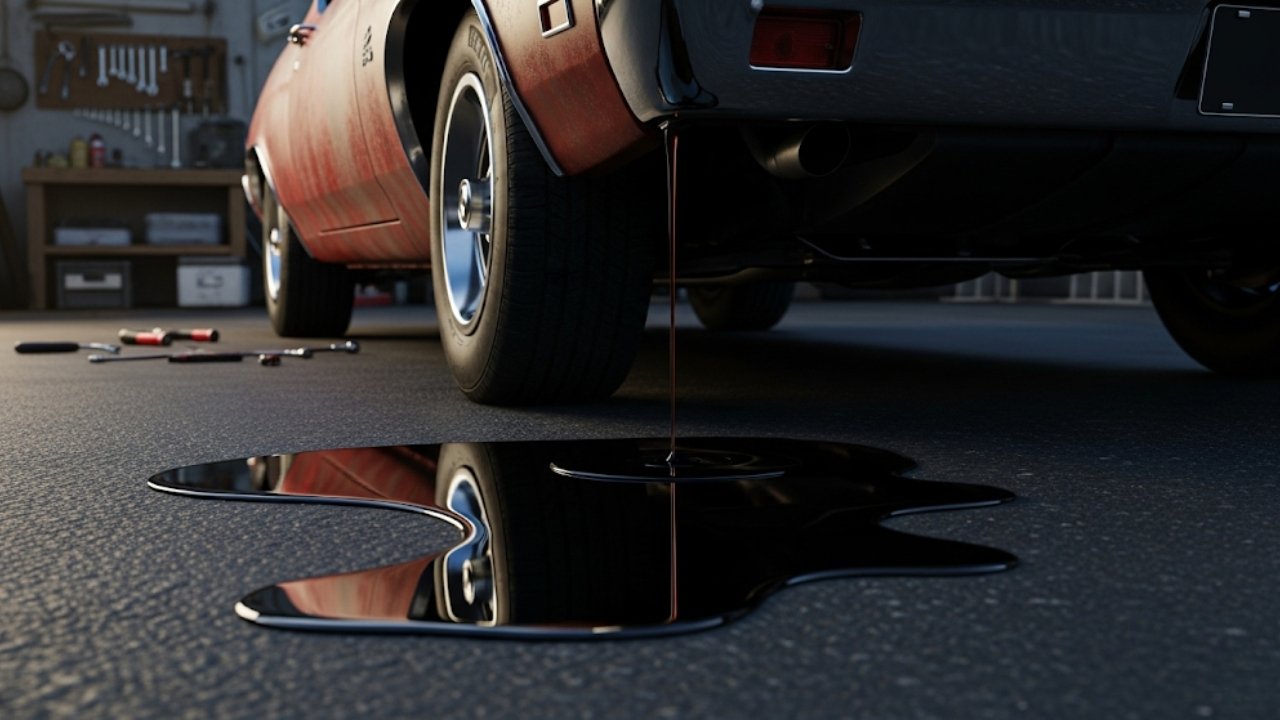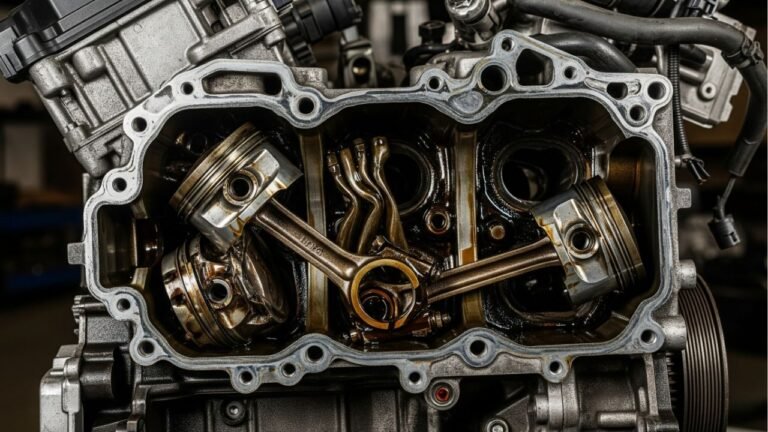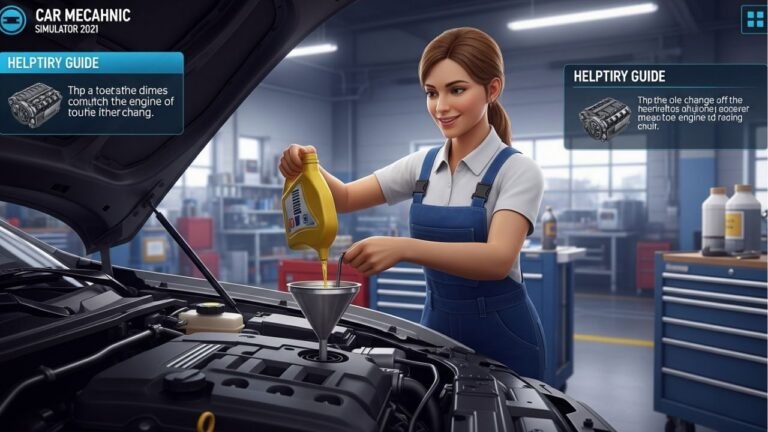What Does It Mean When a Car Leaks Oil?

Ever walked up to your car, excited to head out, only to spot a dark puddle under it? That slow, creeping stain on your driveway isn’t just an eyesore—it’s your car trying to tell you something.
What does it mean when a car leaks oil? Honestly, it can mean a few things, and not all of them are catastrophic. Sometimes, it’s a tiny fix. Other times, it’s your car waving a red flag. As someone who’s panicked over a leaky Corolla in the middle of monsoon season, I totally get the dread.
Let’s unpack the mystery together. I’ll keep it real, relatable, and simple. We’ll go from causes to consequences, and even talk repairs—all in a chill, straightforward way.
In This Article
- 1 Chapter 1: What Exactly Is Engine Oil and Why It Matters
- 2 Chapter 2: Common Signs of an Oil Leak (Before It Gets Worse)
- 3 Chapter 3: So, What Does It Mean When a Car Leaks Oil?
- 4 Chapter 4: Dangers of Ignoring an Oil Leak
- 5 Chapter 5: Diagnosing the Leak Yourself (DIY Basics)
- 6 Chapter 6: Fixing an Oil Leak—Can You Do It at Home?
- 7 Chapter 7: Long-Term Effects of Ignoring an Oil Leak
- 8 Chapter 8: What It Costs to Repair an Oil Leak
- 9 Chapter 9: How to Prevent Future Oil Leaks (Simple Habits)
- 10 ❓ FAQs: What Does It Mean When a Car Leaks Oil?
- 10.1 1. Is it safe to drive with an oil leak?
- 10.2 2. How do I know the difference between oil and other car fluids?
- 10.3 3. Can I use stop-leak products?
- 10.4 4. How long does an oil leak repair take?
- 10.5 5. Will insurance cover oil leak repairs?
- 10.6 6. What causes new cars to leak oil?
- 10.7 7. Does oil leaking affect fuel economy?
- 10.8 8. Can oil leaks cause engine fires?
- 11 Final Thoughts: Listen to Your Car—It Speaks in Oil
Chapter 1: What Exactly Is Engine Oil and Why It Matters

But not just any goo will do. Engine oil:
-
Lubricates moving parts
-
Reduces friction
-
Absorbs heat
-
Prevents rust and wear
-
Cleans debris
Imagine running a marathon in leather pants during summer. That’s your engine without oil—hot, slow, and begging for mercy. So, when oil starts dripping, even a drop, your engine starts suffering.
Chapter 2: Common Signs of an Oil Leak (Before It Gets Worse)
Knowing the early signs of an oil leak can save you a heap of cash—and stress. Here’s what to look for:
-
Oil puddles under the car (brown, black, or amber)
-
Burning oil smell while driving or idling
-
Low oil level on the dipstick
-
Dashboard warning lights (especially the oil can icon)
-
Smoke from the engine bay
Once, I smelled burning oil in traffic and thought someone else had a bad car. Nope—it was mine. The leak had reached the exhaust and was sizzling like bacon. That moment taught me to never ignore that faint, oily whiff.
Chapter 3: So, What Does It Mean When a Car Leaks Oil?
Here’s the heart of the matter. When your car is leaking oil, it usually means something is worn, broken, or loose. It can be as minor as a bad gasket or as serious as a cracked oil pan.
Possible meanings behind oil leaks:
| Leak Source | What It Means | Fix Difficulty |
|---|---|---|
| Valve Cover Gasket | Old and brittle—letting oil escape | Easy |
| Oil Filter/Oil Plug | Loose or misaligned after last oil change | Easy |
| Oil Pan | Crack or hole from hitting debris | Medium |
| Rear Main Seal | Engine disassembly required—leaks near transmission | Hard |
| Timing Cover Gasket | Worn over time, slow leaks | Medium |
| Head Gasket | May signal overheating issues—needs attention | Hard |
In most cases, it doesn’t mean your car is doomed. But it does mean your engine is at risk if you keep ignoring it. A $5 gasket today could save you from a $2,000 engine rebuild tomorrow.
Chapter 4: Dangers of Ignoring an Oil Leak
I get it—you’re busy. Life moves fast, and that small oil spot might not seem like a big deal. But it can be. Letting an oil leak slide is like ignoring a toothache—it gets worse.
Here’s what can go wrong:
-
Engine wear: No oil means more friction. Friction means heat. Heat means damage.
-
Engine overheating: Oil helps regulate temperature. Without it, your engine runs hot and suffers.
-
Oil on belts and sensors: Leaking oil can slip onto belts, damaging them or affecting electronic sensors.
-
Fire risk: If oil hits a hot exhaust manifold, it can smoke—or worse, ignite.
-
Environmental hazard: That puddle can end up in storm drains, hurting local ecosystems.
So if you’re asking “what does it mean when a car leaks oil?”, it also means: pay attention. It’s your car’s way of saying, “Hey, I need help!”
Chapter 5: Diagnosing the Leak Yourself (DIY Basics)
Before you call your mechanic, you can do a quick check to figure out where the leak is coming from. Here’s a simple DIY checklist:
DIY Oil Leak Inspection Tips:
-
Park on clean cardboard overnight. In the morning, note the position and size of the oil stain.
-
Check oil level using the dipstick. If it’s low, add oil immediately.
-
Look under the engine with a flashlight. Check around the oil filter, pan, and gaskets.
-
Wipe the area clean, then drive a short distance. Inspect again to see where the oil is seeping from.
It won’t turn you into a pro, but it helps you talk confidently with your mechanic—or even fix it yourself if it’s a small issue. And trust me, showing up informed saves time and money.
Chapter 6: Fixing an Oil Leak—Can You Do It at Home?
So, can you fix it yourself? Sometimes, yes! It depends on the source and your comfort with tools.
Easy fixes for small oil leaks:
-
Tighten the oil drain plug (sometimes it just gets loose after an oil change)
-
Replace the oil filter if it’s not sealed right
-
Use engine stop-leak additives for very minor leaks (temporary fix)
-
Replace the valve cover gasket (a common DIY job with basic tools)
But if the leak is from the rear main seal, head gasket, or deep inside the engine, it’s best to get a pro. These repairs need special tools, lifts, and hours of labor.
Pro tip: Always clean the area after a repair, so you can confirm the leak is gone.
Chapter 7: Long-Term Effects of Ignoring an Oil Leak
Let me be real here: ignoring an oil leak is like ignoring a leak in your roof. It starts small, but the damage spreads quietly until one day—boom—you’re knee-deep in trouble.
Here’s what can happen if you let it go too long:
-
Engine Seizure: No oil means metal parts grind until the engine freezes. It’s not repairable—you’ll need a full replacement.
-
Catalytic Converter Damage: Oil can seep into your exhaust system and ruin your catalytic converter. That’s an expensive fix.
-
Transmission or Brake Issues: Leaking oil can damage nearby systems, especially if it’s pooling and mixing with dirt or fluids.
-
Reduced Resale Value: Even small leaks show up in inspections. Buyers get scared off, or you’re forced to drop the price.
My cousin once drove with a leak for “just a couple of weeks.” The engine gave out mid-traffic. The repair bill? $3,200. So when asking, “what does it mean when a car leaks oil?”, remember: it’s often a ticking time bomb.
Chapter 8: What It Costs to Repair an Oil Leak
Let’s talk money. The cost to fix an oil leak depends on where the leak is coming from, how bad it is, and whether you do it yourself or hire a mechanic.
Common Oil Leak Repair Costs
| Leak Source | DIY Cost (Parts Only) | Professional Cost |
|---|---|---|
| Oil Filter / Drain Plug | $5 – $20 | $30 – $50 |
| Valve Cover Gasket | $10 – $40 | $100 – $300 |
| Oil Pan Gasket | $20 – $60 | $200 – $500 |
| Timing Cover Gasket | $25 – $70 | $300 – $700 |
| Rear Main Seal | N/A (Pro Only) | $600 – $1,200+ |
| Head Gasket | N/A (Complex Job) | $1,000 – $2,500+ |
Doing it yourself can save hundreds, but only if you’re confident. If not, it’s best to pay a certified mechanic. Trust me, a botched repair can cost more than the original leak.
Chapter 9: How to Prevent Future Oil Leaks (Simple Habits)
Prevention isn’t just smart—it’s way cheaper than repairs. If you treat your engine right, it’ll last years without trouble.
Preventive Maintenance Tips:
-
Change oil regularly: Follow your car’s schedule (usually every 5,000 to 7,500 km).
-
Tighten bolts and caps after oil changes.
-
Avoid potholes and speed bumps at high speed to protect the oil pan.
-
Inspect under your car monthly for new spots or drips.
-
Use high-quality oil and filters—cheap ones often cause leaks.
-
Keep the engine clean: Dirt mixed with oil can worsen leaks.
I clean my engine bay every two months. It’s not just about looks—it helps me spot tiny leaks early. That’s how I once caught a valve cover leak before it even reached the driveway.
❓ FAQs: What Does It Mean When a Car Leaks Oil?
1. Is it safe to drive with an oil leak?
If it’s a small, slow leak, it might be okay short-term. But driving long distances or ignoring it is risky. Your engine needs oil to survive.
2. How do I know the difference between oil and other car fluids?
Oil is typically brown or black and greasy. Coolant is green or pink and watery. Transmission fluid is red. Smell and texture can help tell them apart.
3. Can I use stop-leak products?
For very small leaks, yes—but it’s a temporary fix. Don’t rely on it for serious leaks or long-term use.
4. How long does an oil leak repair take?
Basic repairs can take under an hour. Complex ones like a rear main seal can take 6–8 hours, sometimes longer.
5. Will insurance cover oil leak repairs?
Usually not. Oil leaks fall under wear and tear, which isn’t covered by most policies.
6. What causes new cars to leak oil?
Manufacturing defects, loose filters, or even improper oil changes at the dealership. It’s rare—but it happens.
7. Does oil leaking affect fuel economy?
Yes. An inefficient engine caused by poor lubrication may burn more fuel. Not always dramatically, but it adds up.
8. Can oil leaks cause engine fires?
They can—especially if oil hits hot surfaces like the exhaust manifold. It’s rare, but the risk is real.
Final Thoughts: Listen to Your Car—It Speaks in Oil
So, what does it mean when a car leaks oil? It means your car is whispering, “Something’s wrong.” Whether it’s a little drip or a messy spill, don’t brush it off. Even small oil leaks can grow into big problems if ignored.
And you don’t need to be a mechanic to understand what’s going on. Look under your car. Trust your nose. Keep an eye on that dashboard. Listen to your gut.
Cars are like relationships—maintenance matters. And just like a relationship, the longer you ignore the small signs, the bigger the fallout can be. But stay proactive, and your ride will thank you—with smooth starts, quiet rides, and zero surprises on your driveway.






